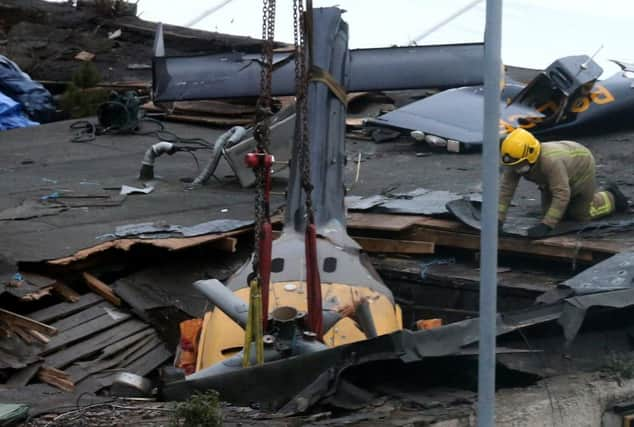‘Lack of evidence’ in Clutha crash ‘frustrating,’ investigator tells inquiry
This article contains affiliate links. We may earn a small commission on items purchased through this article, but that does not affect our editorial judgement.


The police aircraft, which crashed into Glasgow’s Clutha Bar on 29 November 2013, leaving ten people dead, was not fitted with a flight data recorder and was not required to have any such device on board.
Giving evidence at the second week of a Fatal Accident Inquiry (FAI) into the incident, Peter Wivell, senior inspector of air accidents at the Air Accidents Investigations Branch (AAIB) said there were questions he and his colleagues were unable to answer about the tragedy.
Advertisement
Hide AdAdvertisement
Hide AdFour years ago, the AAIB made a raft of recommendations, one of which stipulated that all police helicopters should be fitted with flight recorder systems that would capture a range of data, including images and audio from the flight deck and information about the flight’s pitch and roll.
Had such data been available to the Clutha investigators examining the remains of the twin engine Eurocopter EC 135 aircraft, he said the task of identifying what went wrong would have been much more straightforward.
“The problem with this investigation was a lack of evidence,” he explained. “It would have been ideal to definitively answer questions we can’t answer, which is frustrating for everyone.
“We’d have been much better placed to understand the event if we knew what actually went on in the cockpit. It would have definitely been possible to understand the low fuel warnings, the duration of the warnings, and many other things.”
He also said that data relating to how fuel levels in helicopters fell to a low level was “simplistic,” later describing the assessment of the fuel on board as “calculations based on assumptions and imperfect data.”
Donald Findlay QC, representing the family of victim Robert Jenkins, asked Mr Wivell to clarify for “anyone wondering why we’re not hearing about flight data or black boxes, that’s because there wasn’t one in any shape or form?
He replied: “That’s correct.”
Mr Wivell, a 48-year-old specialist in recorded data, also confirmed an earlier AAIB report which found the helicopter’s two engines had flamed out 32 seconds apart.
It found that the transfer of fuel from the main tank to the supply tank stopped while the helicopter was returning to Glasgow from Dalkeith, leaving only the fuel in the supply tank available to the engines.
Advertisement
Hide AdAdvertisement
Hide AdThe AAIB was unable to pinpoint an exact time this happened, the report added, as it was affected by the accuracy of the fuel burn modelling and the capacity of the supply tank.
The inquiry was also played a video produced by Airbus, the helicopter’s manufacturer, which said the fuel transfer pumps were switched off at some point after it left Dalkeith. It stated: “There is no explanation as to why the pumps both came to be in the switched off position.”
The helIcopter’s pilot, David Traill, 51, along with PC Tony Collins, 43, and PC Kirsty Nelis, 36, were among those who lost their lives.
Also killed were seven customers of the popular bar in the city’s Stockwell Street. They were: Gary Arthur, 48; Joe Cusker, 59; Colin Gibson, 33; Robert Jenkins, 61; John McGarrigle, 58; Samuel McGhee, 56; and Mark O’Prey, 44.
The inquiry, which is taking place at a temporary court in Glasgow’s Hampden Park before Sheriff Principal Craig Turnbull, continues.